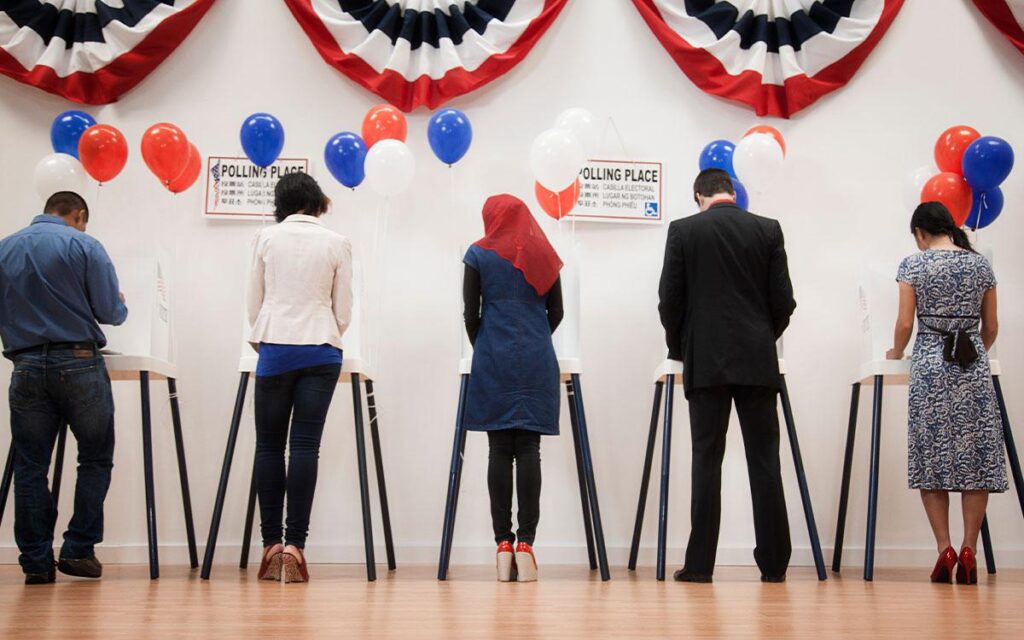By protecting and expanding voting rights, we can ensure that climate policies are developed with equity and justice in mind
lisareiser
Sat, 2024-08-10 02:00

Photo by Hill Street Studios/Getty Images
Ben Jealous
Aug 10 2024
Distributed by Trice Edney Newswire
As we celebrate the 59th anniversary of the Voting Rights Act this month, it is important to remember a crucial fact: The only way to tackle the complex challenges of our time is with a democracy that is responsive to the people it represents.
From racial justice to economic opportunity, gun violence to health care, education to reproductive freedom, no issue stands as an exception. Our ability to tackle the climate crisis—one of our most urgent challenges—depends on the strength of our democracy.
The Biden–Harris administration has made historic progress on climate action. The Inflation Reduction Act and the Bipartisan Infrastructure Law are key policies in the fight against fossil-fuel-driven climate change. Numerous executive orders and agency rulemakings from the administration represent bold climate action. To continue this progress, our democracy must serve the interests of the many, not just the few.
The fight against climate change is not just a scientific or environmental issue but also a deeply political and democratic one. The climate crisis is a global emergency that demands immediate attention and action, and it is the people who have the power to drive and influence our leaders and policymakers to prioritize that action.
The fossil fuel industry, with its immense wealth, has shaped our democracy to serve its interests. We need to strengthen our democracy to better protect voting rights, make voting easier, curtail gerrymandering, and reduce the corrupting influence of money in politics. The power in a democracy should rest with the people and the voice of the voter, not a small handful of executives and investors benefiting from one planet-killing industry.
Transitioning to a clean energy economy is not just a moral imperative, it is an investment in America. It reduces pollution, making the air we breathe, the water we drink, and the soil where our food grows cleaner, safer, and healthier. It is also better for consumers and ratepayers. Renewable energy like solar and wind are already more affordable and resilient than fossil fuels, and that gap is widening. The same goes for electric vehicles.
Speeding up the transition will continue to create jobs, ensure American competitiveness in the next economy, and strengthen our economy. We have already seen well over 300,000 jobs created by the Biden-Harris administration’s investments in clean energy.
Someone who understood this was the late congressman John Lewis. Representative Lewis was a champion for strengthening American democracy and protecting voters’ rights. In his final years, he said, “I do not agree with the dark vision of America’s future [then-President Trump] described that pits accepting responsibility for our environmental impact against the economic stability and vitality of our country.… The rest of the world has seen the economic and environmental benefit of clean energy, and they will leave us behind.”
As we remember Representative Lewis’s legacy this summer—between last month’s anniversary of his passing and the anniversary of the Voting Rights Act this month—let us remember those words as a call to action. There is no conflict between economic prosperity and fighting the climate crisis. The climate fight is a conflict between the tiny number of extremely wealthy and powerful people who benefit from the fossil fuel status quo and the rest of humanity.
By protecting and expanding voting rights—with bills like the John Lewis Voting Rights Act and the Freedom to Vote Act—we can ensure that all voices are heard and that climate policies are developed with equity and justice in mind. When marginalized communities, including communities of color, low-income communities, and Indigenous communities, have a seat at the table and a voice in the democratic process, they are more likely to push for climate policies that prioritize their needs and interests.
Moreover, the same systems and structures that perpetuate the climate crisis also undermine democracy and the rule of law. Democracy is a climate issue, and climate is a democracy issue. By addressing the climate crisis, we can also tackle the underlying democratic deficits that perpetuate inequality and injustice.
Climate justice requires a democratic system that is accountable, transparent, and responsive to the needs and demands of all people, particularly those most affected by climate change. By strengthening democracy, we can ensure that climate policies are developed with the participation and consent of all affected communities.
Let us work together to build a democracy that serves the people, not just the powerful. Let us prioritize voting rights, climate action, and environmental justice. The future of our planet depends on it.
Original Story at www.sierraclub.org
